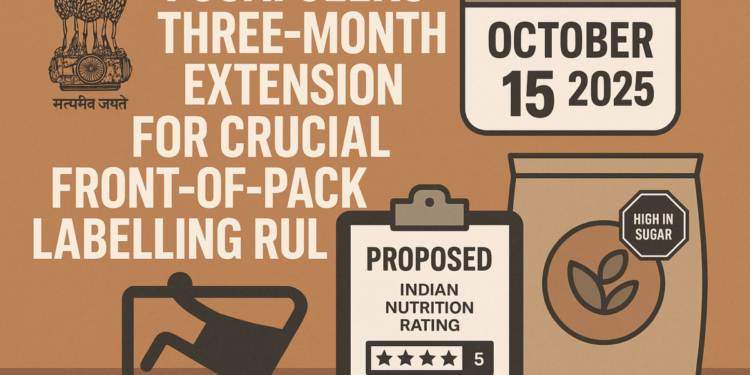-KH News Desk

New Delhi, India – The Food Safety and Standards Authority of India (FSSAI) has formally requested the Supreme Court for an additional three months to finalize its highly anticipated front-of-pack labelling (FOPL) regulations. This plea comes as the food regulator faced a July deadline to frame a stringent law aimed at providing consumers with clear, pictorial information about the nutritional content of packaged foods, particularly concerning ingredients linked to lifestyle diseases such as fats, salt, and sugar.
The FOPL initiative is a critical component of India’s broader public health strategy, designed to empower consumers to make informed dietary choices and, in turn, nudge food producers towards creating healthier products. Currently, packaged food companies in India are only mandated to print nutrient information on the back of their products. However, global evidence strongly suggests that front-pack labelling is significantly more effective in reducing the consumption of unhealthy foods.
The Supreme Court’s directive in April had set a three-month deadline for an expert committee to submit its recommendations on introducing mandatory warning labels on the front of packaged food items. The FSSAI’s request for an extension underscores the intricate and time-consuming procedures involved in developing and implementing such a comprehensive regulatory framework across a market as vast and diverse as India.
The Imperative for Clear Labelling
India is currently undergoing a rapid nutritional transformation, largely driven by lifestyle changes, increasing urbanization, and the widespread availability of ultra-processed foods (UPFs).These dietary shifts have significantly contributed to a surge in non-communicable diseases (NCDs), which now account for a substantial portion of mortality and disease burden in the country. Experts predict that India could bear approximately 25% of cardiovascular-related deaths globally and become home to over 50% of heart ailment patients worldwide by 2035. Diets high in trans-fats, for instance, are known to increase heart risk by 21% and deaths by 28%.
The FOPL aims to combat this growing health crisis by making nutritional information easily comprehensible. Various FOPL systems are in use or under consideration globally, including warning labels, keyhole logos, health star ratings (HSR), traffic light labelling, and Nutri-score. Research indicates that summary ratings like HSR and warning labels are highly effective in terms of ease of identification, understanding, reliability, and influence on consumer behavior. While HSR appears more acceptable and easier to understand, especially in Southern, Central, and Western regions of India, other formats like Multiple Traffic Light (MTL) systems are preferred for reflecting necessary health information and the presence of unwanted nutrients.
Challenges and Industry Resistance
The path to mandatory FOPL implementation has not been without its hurdles. The food industry has historically shown intense opposition to mandatory regulations, often leading to delays or voluntary implementation in many jurisdictions. One of the primary concerns raised by the industry is the significant cost associated with changing labels and designs, which could amount to millions of rupees, posing a substantial burden, particularly for small and medium-sized food companies. There are also concerns that if a major portion of the front-of-pack is covered with information on high fat, sugar, and salt (HFSS) content, other important nutrient information might not receive adequate space.
Furthermore, the FSSAI’s past enforcement practices have sometimes led to challenges for importers and food businesses. Delays in clearing consignments, particularly refrigerated cargo, have resulted in substantial demurrage costs, sometimes exceeding the value of the product itself. The shift to testing one sample from every product variant, instead of one or two from a consignment, has also increased testing costs and clearance times, impacting operational efficiency.
FSSAI’s Broader Regulatory Push
Despite these challenges, the FSSAI remains committed to strengthening food safety and compliance across the industry. Beyond FOPL, the regulator has been actively pushing for greater transparency and accountability. Recently, the FSSAI urged Food Business Operators (FBOs) to file accurate annual returns, warning of severe penalties under the Food Safety and Standards Act, 2006, for false or misleading information.[7] They have also provided a mechanism for businesses to revise previously submitted data, emphasizing the importance of timely corrections.
The FSSAI has also intensified its scrutiny of e-commerce platforms, directing them to share data on warehouses and food handlers and to prominently display their FSSAI license numbers on all receipts. This comes after instances of food safety lapses led to the temporary suspension of licenses for some quick commerce dark stores.[8] Additionally, the FSSAI has issued advisories on maintaining hygiene, such as cleaning and defrosting refrigerators every two weeks during monsoon season, to prevent bacterial growth and food spoilage.
Looking Ahead
The FSSAI’s continued efforts to implement FOPL and other stringent food safety measures are crucial for public health in India. While the extension for FOPL indicates the complexity of the task, it also highlights the regulator’s commitment to developing a system that is both effective and practical for the industry. The goal is to create a straightforward, uniform, and evidence-based approach to mandatory FOPL implementation that addresses India’s unique dietary landscape. Collaboration among policymakers, industry stakeholders, and public health advocates will be essential to foster healthier eating habits nationwide and reduce the burden of NCDs. The outcome of these regulations will significantly shape the future of packaged food consumption and production in India.







